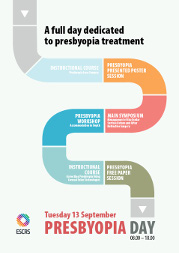World literature review of modern LASIK outcomes
Session Details
Session Title: LASIK
Session Date/Time: Monday 12/09/2016 | 08:00-10:30
Paper Time: 08:30
Venue: Hall C3
First Author: : H.Sandoval USA
Co Author(s): : E. Donnenfeld T. Kohnen R. Lindstrom R. Potvin D. Tremblay K. Solomon
Abstract Details
Purpose:
To compare modern LASIK outcomes reported in the peer-reviewed literature with earlier data reported to the US Food and Drug Administration (FDA).
Setting:
Literature Review
Methods:
LASIK articles published from 2008 to 2015 that contained clinical outcomes data were reviewed and graded for quality, impression and potential industry bias. Clinical outcomes data including post-operative refractive data, uncorrected and best-corrected visual acuities (UCVA and BCVA) and the loss/gain of lines of best-corrected acuity were recorded and analyzed, categorized by variables such as study size, ablation profile and pre-operative refractive error. The aggregate data were compared to historical data from several available summaries of safety and effectiveness (SSE) for different laser systems when they were approved for use by the FDA.
Results:
Ninety-seven relevant articles were identified; all provided a positive or neutral impression of LASIK. Industry bias was not evident. The aggregate loss of 2 or more lines of BCVA was 0.61% (359/58653). The overall percentage of eyes with UCVA better than 20/40 was 99.5% (59503/59825). The spherical equivalent refraction was within 1.0D of intended in 98.6% (59476/60329) of eyes. In studies that reported on patient satisfaction 1.2% (129/9726) of patients were dissatisfied with LASIK. Aggregate outcomes were generally better than reported in SSEs for laser systems approved by the FDA.
Conclusions:
It appears that the clinical outcomes of modern LASIK are generally better than those reported for early LASIK systems. Our findings support the safety, efficacy, and patient satisfaction of this laser refractive procedure.
Financial Disclosure:
NONE





